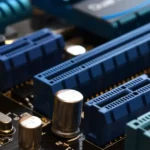
One of the most common questions asked by first-time hardware builders is, “Will my CPU work with my motherboard?” This question usually comes after the purchaser has decided on a budget or specific make/model of motherboard and CPU.
CPU Motherboard compatibility depends on the motherboard socket type and chipset, and the first thing you should check is the CPU socket type.
For example, if you have a 10th or 11th-generation Intel CPU, you will need a motherboard with an LGA1200 socket, but if you have an AMD Ryzen CPU, the motherboard you choose should have an AM4 socket. You can easily find this information in your motherboard and CPU specs.
If you want a more in-depth analysis of the different motherboards’ CPU socket types and motherboards’ chipsets, keep on reading.
So, what motherboard is compatible with my Processor?
Table of Contents
We have already answered this question in the previous paragraph. If you have a 10th or 11th-generation Intel CPU, you will need a motherboard with an LGA1200 socket, and for AMD Ryzen CPUs, you need a motherboard with an AM4 socket.
Related Article: Can I Upgrade CPU Without Changing Motherboard? [Solved]
What is a CPU socket?
A socket is where the CPU (central processing unit) is inserted into the motherboard. The socket type refers to the physical characteristics of the slot, such as the number of pins, the physical dimensions, the location of the pins, etc.
So this means that if you try to install a CPU in the wrong socket type, it will simply not fit, and if you try to fit it, you can damage both your CPU and motherboard.
Related Article: Is Building A PC Hard?
Different types of mounting techniques and socket types
In the intro section, I told you that if you have a 10th or 11th-generation Intel CPU, you will need a motherboard with an LGA1200 socket, and if you have an AMD Ryzen CPU, you need a motherboard with an AM4 socket.
But these are not the only CPU sockets you will find on the market. So, let’s talk about the different types and mounting techniques:
- LGA: LGA stands for Land Grid Array and is the mounting technique of Intel. In this technique, the motherboard socket has pins, and the CPU has pads. The CPU is placed on the motherboard and then locked in place with a clip. The number after the LGA indicates how many pins are on the CPU. For example, an LGA1200 socket has 1204 pins.
- PGA: PGA stands for Pin Grid Array and is the mounting technique of AMD CPUs. In this mounting technique, the CPU has pins, and the motherboard socket has holes.
- BGA: BGA stands for Ball Grid Array and is the mounting technique used on laptops. The problem with this mounting technique is that the CPU is soldered to the motherboard and cannot be replaced.
Related Article: Thermal Paste On CPU Pins: How To Remove It! [Step-By-Step]
Most Popular Types of CPU Sockets
Now that you know about the different types of CPU sockets, let’s see the most popular types:
Intel Sockets
As you already know, Intel CPUs support LGA sockets, but not all LGA sockets are the same. There are three main types:
- The LGA1151 socket is the older socket that was used with the 7th, 8th, and 9th generation, of Intel Core, Celeron, and Pentium CPUs.
- The LGA1200 sockets are used with Intel CPUs’ 10th and 11th generation.
- The LGA1700 is the replacement of the LGA1200 and is used with the 12th generation of Intel processors.
There is also the workstation socket LGA2066 which is used with Intel Core Extreme CPUs.
AMD Sockets
AMD uses the AM4 socket with all their CPUs, so no matter which AMD CPU you have, you can be sure that it will work with an AM4 socket motherboard.
When it comes to workstations, AMD uses the sTRX4 socket.
Related Article: Does Ryzen Have Integrated Graphics?
How to find out which socket your CPU supports?
Finding out which socket type your CPU supports is extremely easy. You can find this information online by checking the specs of your CPU on the official website of your CPU’s manufacturer.
As you can see on the screenshot below that was taken from the official site of Intel, the supported socket type is listed and is LGA1200.
The socket is FCLGA1200. FC stands for Flip Chip, LGA stands for Land Grid Array, and finally, the number 1200 stands for the number of pins.
Related Article: What Ram Is Compatible With My Motherboard?
How to find out which socket type your motherboard has?
Just like you did to find out which socket type your CPU needs, the same applies to finding out which socket type your motherboard has. You can do this by checking the specs of your motherboard on its official website.
As you can see on the screenshot below, the socket type is LGA1200, so if you wanted to buy the CPU of the above example, this motherboard would be compatible.
Motherboard Chipset and CPU Compatibility
As already mentioned, the socket type is not the only thing you need to know before buying a compatible CPU. The motherboard chipset also plays an important part in processor compatibility.
What I mean is that motherboards with the same socket type (e.g., LGA1200) can have different chipsets (e.g., X570 and B450).
A motherboard chipset is a silicon chip on the motherboard that is used with particular CPU generations.
For example, the B550 chipset was manufactured for use with the Ryzen 5000 AMD CPUs, while the B350 chipset was manufactured for use with the Ryzen 1000 AMD CPUs.
What happens if you have an older chipset motherboard?
If you have an older chipset motherboard and buy a new CPU, you won’t be able to use it and will have to update the motherboard’s BIOS version. After updating the BIOS, you might be able to use your new CPU, but it is not recommended.
What happens if you have a new chipset motherboard and an old CPU?
The answer to this question is it depends. As long as the motherboard has the same socket type and chipset as the old one, then it will most likely work. But if the processor socket is the same and the chipset is different, then you probably have to buy a new CPU.
Related Article: Can You Use An Nvidia Graphics Card With An AMD Processor?
Conclusion
Finding if your CPU is compatible with your motherboard isn’t hard, but you have to know which socket model your CPU supports and what your motherboard’s chipset is. So before buying a new CPU, make sure that your motherboard has the exact socket type and chipset your CPU supports.
If you have any questions, then feel free to comment below.
Cheers!


![Does CPU affect FPS? [Solved] 8 Does CPU affect FPS? [Solved]](https://pcexplorers.com/wp-content/uploads/2025/05/image-15-150x150.png)
![Logic Board vs Motherboard [Explained] 9 Logic Board vs Motherboard](https://pcexplorers.com/wp-content/uploads/2024/10/Logic-Board-vs-Motherboard-150x150.webp)

